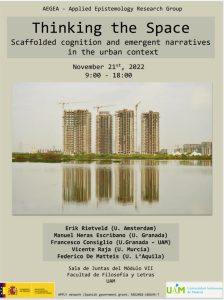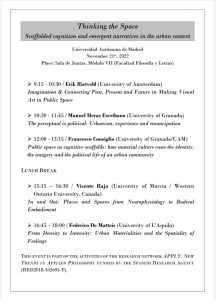El 21 de noviembre de 2022 se ha celebrado el workshop internacional Thinking the Space, reuniendo en Madrid a expertos de filosofía de la mente y de las ciencias cognitivas, expertos en psicología ecológica y en arquitectura, para enfocar la relación existente entre espacios urbanos y cognición. El workshop ha sido organizado por nuestro compañero Francesco Consiglio (UGR – FiloLab/UAM) y Jesús Vega (UAM), contando con los siguientes ponentes: Erik Rietveld (U. Amsterdam); Manuel Heras Escribano (U. Granada – FiloLab); Francesco Consiglio (U. Granada – FiloLab / UAM); Vicente Raja (U. Murcia); Federico de Matteis (U. L’Aquila).
«In recent years, a renovated interest for the space and its affordances has arisen in the research on human cognition. Both philosophers and cognitive scientists have stressed the relevance of material supports for human cognitive dynamics arguing for a scaffolded dimension of the mind. In this context, some theorists have proposed a Material Engagement Theory, some others have contributed to the debate with the Skilled Intentionality Framework. In particular, the Skilled Intentionality Framework has been applied to the urban context, with a central focus on the public domain and its social relevance: «A public domain is a place where people from different socio-cultural groups can meet and sometimes actually do meet […] This important topic forces architects and urban designers to consider the fact that they shape more than just the physical environment — to a certain extent they also bear responsibility for the role that their designs have in shaping social reality» (Rietveld, Rietveld, and Martens 2019, p. 303). This research on how people relate themselves to the urban space rises important questions about the evolutive dynamics of urban spaces, the management of the public space and its aesthetical and ethical relevance for the community. Also, recent studies have connected the use of public space in the city to the emergence of a ‘sense of identity’ of the community living there.
Considering this background, the central question of this workshop is how the environment (and, especially, the urban environment) supports and influences our cognition. In particular, do the architectonical structures give us a determinate perception of the space in our neighbourhood? Do these architectonical structures influence how we use the space and the related idea of social life that we develop? How the urban design and the urban development planning can afford a ‘model of the world’ to the agents who inhabit that space, how these factors can shape their values (not just ‘how the world is’ but also ‘how the world should be’)? In sum, can a certain ‘usability’ of the architectonical structures (and, in general, the space) of a city or a neighbourhood implement a determinate narrative for the community that inhabits that space?»
Rietveld, Erik, Ronald Rietveld, and Janno Martens. 2019. “Trusted Strangers: Social Affordances for Social Cohesion.” Phenomenology and the Cognitive Sciences 18 (1): 299–316. https://doi.org/10.1007/s11097-017-9554-7.


